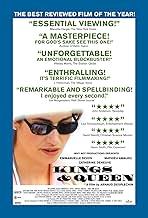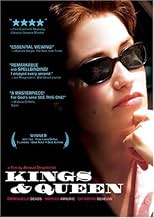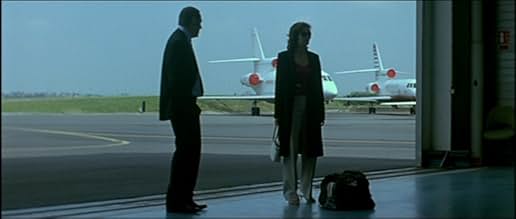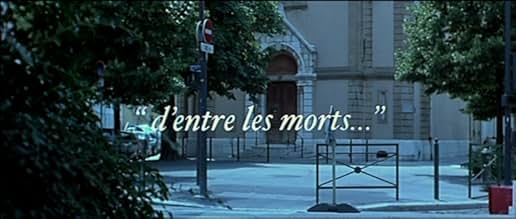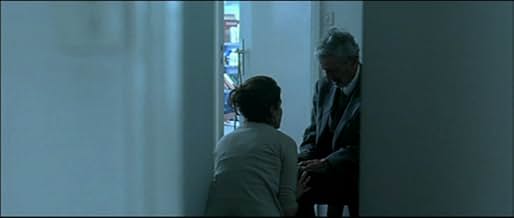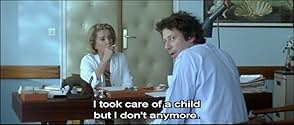AVALIAÇÃO DA IMDb
7,0/10
4,1 mil
SUA AVALIAÇÃO
Histórias paralelas contam a situação atual de dois ex-amantes: Nora é uma mãe solteira que cuida de seu pai em estado terminal; enfiado em uma enfermaria psiquiátrica, Ismael, um músico bri... Ler tudoHistórias paralelas contam a situação atual de dois ex-amantes: Nora é uma mãe solteira que cuida de seu pai em estado terminal; enfiado em uma enfermaria psiquiátrica, Ismael, um músico brilhante, planeja sua fuga.Histórias paralelas contam a situação atual de dois ex-amantes: Nora é uma mãe solteira que cuida de seu pai em estado terminal; enfiado em uma enfermaria psiquiátrica, Ismael, um músico brilhante, planeja sua fuga.
- Direção
- Roteiristas
- Artistas
- Prêmios
- 9 vitórias e 18 indicações no total
- Direção
- Roteiristas
- Elenco e equipe completos
- Produção, bilheteria e muito mais no IMDbPro
Avaliações em destaque
Nora (the devastating and luminous Emmanuelle Devos) is a single mother who suddenly has to care for her dying father (a successful writer straining to put the finishing touches on his last book, a memoir of sorts) on the eve of marrying her new suitor. Ismael (the fantastic Mathieu Amalric) is her "ex-boyfriend" who cared for her son most of the boy's life, and is a struggling musician who suddenly finds himself trapped in the loony bin thanks to an over-zealous sister, a bitter friend, and a "judicial error." Director Desplechin (this is the only film I have seen of his) does a nice job flipping back and forth between the utter bleakness and emotional hell of caring for a dying parent, and the absurd serio-comic-horror of being stuck in the "crazy hospital" against your will.
There's a lot of play with psychoanalysis (highlighted by Catherine Denueve in a bit part as a psychiatrist) that is fun and illuminating to watch. There's speckles of romance, dark humor, nihilism, magic realism, and soap opera theatrics with lots of references to philosophy, mythology, and poetry that keep the film interesting and unpredictable even as its over two and a half hour run time tries your patience. There are plenty of revelations and big emotional payoffs here punctuated well with eclectic music choices (everything from classical pieces to some sort of catchy European hip-hop) and nice little surprises (Magalie Woch is delightful as the lovely suicidal mental patient who becomes smitten with Ismael). This utterly French film gives the viewer a lot to chew on, even if you have to gnaw through a bit of gristle before dining on the filet mignon.
There's a lot of play with psychoanalysis (highlighted by Catherine Denueve in a bit part as a psychiatrist) that is fun and illuminating to watch. There's speckles of romance, dark humor, nihilism, magic realism, and soap opera theatrics with lots of references to philosophy, mythology, and poetry that keep the film interesting and unpredictable even as its over two and a half hour run time tries your patience. There are plenty of revelations and big emotional payoffs here punctuated well with eclectic music choices (everything from classical pieces to some sort of catchy European hip-hop) and nice little surprises (Magalie Woch is delightful as the lovely suicidal mental patient who becomes smitten with Ismael). This utterly French film gives the viewer a lot to chew on, even if you have to gnaw through a bit of gristle before dining on the filet mignon.
"Kings and Queen (Rois et reine)" is a deceptively beautiful looking exploration of the differences between appearances and substance.
Our first impressions of each parallel character who seems to have no relation with any other character undergo a complete turn-around by the time we have finished circling around them in time and space at the end of the film, especially as we begin to realize they are unreliable, self-serving narrators of their own experiences.
Each person is part of a very modern blended family, both by genetics and selection, and faces the most quotidian of life cycle decisions -- life, birth, marriage, paying bills, parent/child responsibilities, Laingian sanity and particularly death -- and makes a different choice how to handle them, whether active or passive, peremptorily or as fate.
But each choice leads them to the next unexpected plateau of choices with guilt hanging on each move. For each, doing the right thing means something completely different as each responds differently to an emotional and physical crisis.
Though psychoanalysis is drolly mocked as just another philosophy, each character may be eccentric or seriously crazy and undergoes Freudian traumatizations by family in casually cruel ways that alternate between funny and shocking (and sometimes absurd).
Director/co-writer Arnaud Desplechin revels in the diversity of his characters, so that as their orbits collide they can hardly communicate because their frames of reference are so different.
The acting brilliantly matches the unexpected revelations that flash back to let us know how each character got to be this person and the transformations to where they are going. Emmanuelle Devos as "Nora" lusciously fills the screen even as we find that her nonchalant beauty masks the devastation she leaves in her wake as it helps her use others for her selfish needs.
Desplechin has frequently cited Woody Allen as an influence (and "Seinfeld"), and Mathieu Amalric's Ismaël is a tribute to that talkative, intellectual Jewish persona and Philip Roth is mentioned as well, though this character is much more up on hip pop music and surprisingly matures as he gains far more humanity than his New York inspirations.
The film is long and slow, but curiosity about how each character got to where the film started is involving.
It's impossible to keep up with all the erudite references to poetry (Desplechin says the title comes from a chess metaphor in a French poem: "King without kingdom/ Queen without a scene/ Castle broken/ Bishop betrayed/ Fool as a brave man"), literature, mythology, art, music and film ("Moon River" seems to be used frequently these days).
Eric Gautier's cinematography is sensual and is particularly dreamy when an awful event occurs.
The production design creates illustrative environments for each person and family, as every object around each character has ironic counterpoint to the dialog.
The soundtrack eclectically extends from electronica to klezmer to hip hop to singer/songwriters Paul Weller and Randy Newman to classical and more that reflect the characters' psychological mise en scenes.
Our first impressions of each parallel character who seems to have no relation with any other character undergo a complete turn-around by the time we have finished circling around them in time and space at the end of the film, especially as we begin to realize they are unreliable, self-serving narrators of their own experiences.
Each person is part of a very modern blended family, both by genetics and selection, and faces the most quotidian of life cycle decisions -- life, birth, marriage, paying bills, parent/child responsibilities, Laingian sanity and particularly death -- and makes a different choice how to handle them, whether active or passive, peremptorily or as fate.
But each choice leads them to the next unexpected plateau of choices with guilt hanging on each move. For each, doing the right thing means something completely different as each responds differently to an emotional and physical crisis.
Though psychoanalysis is drolly mocked as just another philosophy, each character may be eccentric or seriously crazy and undergoes Freudian traumatizations by family in casually cruel ways that alternate between funny and shocking (and sometimes absurd).
Director/co-writer Arnaud Desplechin revels in the diversity of his characters, so that as their orbits collide they can hardly communicate because their frames of reference are so different.
The acting brilliantly matches the unexpected revelations that flash back to let us know how each character got to be this person and the transformations to where they are going. Emmanuelle Devos as "Nora" lusciously fills the screen even as we find that her nonchalant beauty masks the devastation she leaves in her wake as it helps her use others for her selfish needs.
Desplechin has frequently cited Woody Allen as an influence (and "Seinfeld"), and Mathieu Amalric's Ismaël is a tribute to that talkative, intellectual Jewish persona and Philip Roth is mentioned as well, though this character is much more up on hip pop music and surprisingly matures as he gains far more humanity than his New York inspirations.
The film is long and slow, but curiosity about how each character got to where the film started is involving.
It's impossible to keep up with all the erudite references to poetry (Desplechin says the title comes from a chess metaphor in a French poem: "King without kingdom/ Queen without a scene/ Castle broken/ Bishop betrayed/ Fool as a brave man"), literature, mythology, art, music and film ("Moon River" seems to be used frequently these days).
Eric Gautier's cinematography is sensual and is particularly dreamy when an awful event occurs.
The production design creates illustrative environments for each person and family, as every object around each character has ironic counterpoint to the dialog.
The soundtrack eclectically extends from electronica to klezmer to hip hop to singer/songwriters Paul Weller and Randy Newman to classical and more that reflect the characters' psychological mise en scenes.
Armand Deplechin's "Rois et Reine" offers a lot of different ideas, plots and subplots. Unfortunately, most of them aren't as fully realized as in his other, better made films. Then, the copy that is showing at New York's Lincoln Plaza complex, has a washed out look to it, and the subtitles aren't visible at times. The viewer has to strain the eyes in order to get all what's going on in this complex tale. This is a big problem for foreign films with subtitles that seem to fade in the picture itself. Also, at the session we went there was an annoying group of ladies who, evidently, must have been watching another film, as they kept laughing at times when they should have remained silent.
At any rate, this is a complex film that seems to have a lot of influences, mainly mythological and even it has shades of Shakespeare's King Lear. At two hours and forty minutes in length, the film could have used some badly needed trimming. It appears M. Desplechin don't know when to cut some of the things one sees in different sequences that could have been helped with the principle that "less is more".
One thing the director can't be blamed for is the wonderful performances he gets from all his actors, especially, the luminous Emmanuelle Devos, who does an amazing work portraying Nora, the woman at the center of the story. Also good, Mathieu Amalric, who is Ismael, the man that connects a lot of different points to the story. Maurice Garrel, as Nora's dying father is compelling. Valentin Legong as little Elias is also a great asset.
Let's hope M. Desplechin new venture will be a bit tighter in his future work.
At any rate, this is a complex film that seems to have a lot of influences, mainly mythological and even it has shades of Shakespeare's King Lear. At two hours and forty minutes in length, the film could have used some badly needed trimming. It appears M. Desplechin don't know when to cut some of the things one sees in different sequences that could have been helped with the principle that "less is more".
One thing the director can't be blamed for is the wonderful performances he gets from all his actors, especially, the luminous Emmanuelle Devos, who does an amazing work portraying Nora, the woman at the center of the story. Also good, Mathieu Amalric, who is Ismael, the man that connects a lot of different points to the story. Maurice Garrel, as Nora's dying father is compelling. Valentin Legong as little Elias is also a great asset.
Let's hope M. Desplechin new venture will be a bit tighter in his future work.
"Rois et reine" aka "Kings and Queen" (2004) directed by Arnaud Desplechin is a most unusual film that mixes expertly comical and tragic, unbearable and optimistic, life and death that are intertwined in the story of two former lovers whose lives have crossed once more when they least expected. Nora (Devos) has to take care of her dying father. Ismael (Almaric), a talented but neurotic musician (Roman Polansky + Woody Allen) is mistakenly committed to a mental hospital under the care of a clinical psychiatrist, forever young and still the most beautiful woman in the world, Catherine Denueve. ("Do you know that you are very beautiful"? - asked Ismael. "I've been told", smiles she). I still think about the movie - the complicated relationships between one woman and several men in her life - how much she affected them, sometimes, with tragic consequences. This is also the movie about perception - how big is the difference between the way we see ourselves and the others see us and what they think of us in reality. It is a movie about love - is it always blind? Is it possible to love deeply and see with the clear eyes? I was totally engrossed and heartbroken by some scenes involving Devos's caring for her dying father, by the flashbacks that tell about her relationship with the father of her son, and next minute I was laughing out loud following the Almaric's ordeal in a mental hospital and his attempts to escape. The movie could've been a gem but it is too long, has too many characters that were perhaps very interesting but I never knew what happened to them and it could be confusing due to its broken narrative which was OK by me but the final result even compelling and memorable was not completely satisfying. Both Mathieu Almaric and Manu Devos are marvelously talented actors and they were the main reason that overlong and confusing movie worked. I hope to see both Almaric and Devos in many more movies. I remember Devos since the first movie I saw her in - "Sur Mes Levres" and I knew then that she had all potentials to become a great actress. Her acting in "Rois et reine" confirmed my first impression.
How do you create a follow up to the two masterpieces that were "Comment je me suis disputé" and "Ester Kahn" (we won't talk about the dull "Léo... en jouant Dans la compagnie des hommes") ? You just listen to what your heart has to say, however hard and difficult it might be, and make no compromises. You don't fear to be misunderstood. You care about the audience but do not let them influence your work. You're a genius but you still have doubts, and these doubts make your art even better. "Rois et Reine" ("Kings and Queen"), Arnaud Desplechin's latest film, lasts 2h40mn and, in spite of its length and its harsh contents, is utterly entertaining, fascinating, moving and even funny. It does not fear to be (often) irritating and boring : the burlesque moments, for instance, are quite annoying, but then again, that's a personal point of view. The thing is, the storyline about Nora's relationship with her father and her ex boyfriend and her son, and then again Ismael's relationship with Nora's son and with his family are so powerful, they don't need more. Unfortunately, Desplechin is often reluctant to cut deep in his movie and as a result, "Rois et Reine" sometimes looks like a long, long ride. Add to that some unfortunate flash backs burdened by bad acting (the character of Pierre) and boy does the movie sound dull at times. Emmanuelle Devos and Mathieu Amalric, finding here the roles of a lifetime, are absolutely fascinating. When in the end, Nora discovers the secret pages of her father's diary, or when Ismael spends an afternoon with Nora's son, it's devastating. I've rarely seen a movie that translates human emotions so beautifully. Just for that, "Rois et reine" is a must see.
Você sabia?
- CuriosidadesThe title of the movie was inspired to Arnaud Desplechin by the five first lines of a poem by Michel Leiris: "Rois sans arrois Reine sans arène Tour trouée Fou à lier Cavalier seul"
- Citações
Nora Cotterelle: There are four men I loved. I killed two of them.
- ConexõesReferenced in Totalmente Apaixonados (2005)
- Trilhas sonorasPavane pour une Infante défunte
Composed by Maurice Ravel
Principais escolhas
Faça login para avaliar e ver a lista de recomendações personalizadas
- How long is Kings & Queen?Fornecido pela Alexa
Detalhes
Bilheteria
- Orçamento
- € 3.871.153 (estimativa)
- Faturamento bruto nos EUA e Canadá
- US$ 290.973
- Fim de semana de estreia nos EUA e Canadá
- US$ 16.101
- 15 de mai. de 2005
- Faturamento bruto mundial
- US$ 3.839.556
- Tempo de duração
- 2 h 30 min(150 min)
- Cor
- Mixagem de som
- Proporção
- 2.35 : 1
Contribua para esta página
Sugerir uma alteração ou adicionar conteúdo ausente

